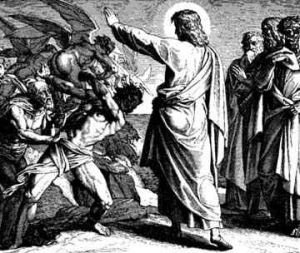Template:Demoniact

Demoniac
As an adjective a demoniac is "Possessed, produced, or influenced by a demon." Therefore, a "demoniac creatures."
Although the term may be someone "resembling, or suggestive of a devil; fiendish" or descriptive of or having "characteristic of, a demon or evil spirit; devilish."
The Place
Matthew 8:28 “When he came to the other side, to the country of the Gergesenes[1], two demoniacs coming out of the tombs met him.”
Mark 5:1 “They came to the other side of the sea, to the country of the Gadarenes[2].”
Luke 8:26 “Then they arrived at the country of the Gadarenes[2], which is opposite Galilee.”
Gergesa, or גִּרְגָּשִׁי Girgashiy from which the name Gergesenes is taken, is an old town in the area of a lake called Tiberias. It has edge with a steep place which the swine could have fallen from.
- ↑ 1086 Γεργεσηνός Gergesenos [gher-ghes-ay-nos’]
of Hebrew origin 01622 גרגשׁים; adj; AV-Gergesenes 1; 1 Gergesenes = "a stranger drawing near"?
- 1) also called Gadarenes, is assumed to have been located on the eastern shore of Lake Gennesaret
- ↑ 2.0 2.1 1046 Γαδαρηνος Gadarenos gad-ar-ay-nos’; from (a town east of the Jordan); a Gadarene or inhabitant of Gadara: — Gadarene.
: 1 Gadarenes = "reward at the end"
- 1a also called Gergesenes, was the capital of Peraea, situated opposite the south extremity of the Lake of Gennesaret to the south-east, but at some distance from the lake on the banks of the river Hieromax.
- 2 The term Peraea is used by Josephus to denote the district to which the rabbis refer as "the land beyond Jordan." This corresponds to the New Testament phrase peran tou Iordanou (Matthew 4:15; Matthew 19:1)
- 2a Under rulership of Hyrcanus the Jews influenced the area but with the death of Herod the Great it became part of the tetrarchy of Antipas (Ant., XVII, vii, 1).